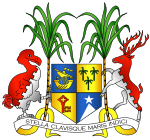| |||||||||||||||||||||||||
All 62 directly elected seats in the National Assembly (and up to 8 BLS seats) | |||||||||||||||||||||||||
|---|---|---|---|---|---|---|---|---|---|---|---|---|---|---|---|---|---|---|---|---|---|---|---|---|---|
| |||||||||||||||||||||||||
 Result by constituency. The colour shade shows the percentage of the elected candidate with the highest number of votes | |||||||||||||||||||||||||
| |||||||||||||||||||||||||
 |
|---|
| Constitution |
General elections were held in Mauritius on 10 November 2024.[1] The election was called after the government reached a deal with the United Kingdom to end the Chagos Archipelago dispute. Shortly before the election, a wire-tapping scandal surfaced. The government responded by implementing a social media ban that was to last until after the election but was instead lifted a day later following public outcry.[2] Alliances that contested the election include Prime Minister Pravind Jugnauth's Alliance Lepep and former Prime Minister Navin Ramgoolam's Alliance du Changement. Key campaign issues included the cost of living, crime and corruption. A total of 1,002,857 registered voters were eligible to vote. Votes were counted on 11 November, with turnout at 79%.[3]
Alliance du Changement won the election in a landslide,[4] winning all but one of the country's 21 constituencies. Jugnauth conceded defeat shortly after vote counting began.[5] It was the largest margin of victory since 1995. Four unsuccessful candidates were appointed through the Best Loser System, including two from Alliance Lepep and two from Alliance Liberation. Due to the plurality block voting system with panachage, total votes exceed the total number of registered electors. Ramgoolam was sworn in as prime minister on 13 November, and his cabinet was inaugurated on 22 November.
- ^ "Mauritius to hold legislative election on November 10". France 24. Port Louis. Retrieved 5 October 2024.
- ^ "Mauritius Heads To The Polls Under Wire-tapping Cloud". Barron's. 7 November 2024. Archived from the original on 8 November 2024. Retrieved 8 November 2024.
- ^ "Élections Générales : La nouvelle liste d'électeurs entre en vigueur aujourd'hui". Le Mauricien (in French). 16 August 2024. Archived from the original on 13 November 2024. Retrieved 13 November 2024.
- ^ "Mauritius opposition wins country's election by a landslide". Associated Press. 12 November 2024. Retrieved 12 November 2024.
- ^ "Mauritius opposition wins country's election by a landslide". ABC News. 12 November 2024. Retrieved 12 November 2024.

